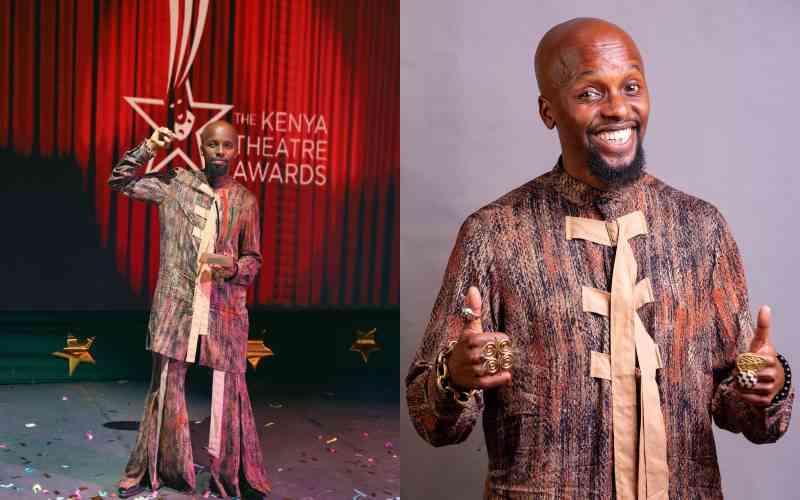Mugambi Nthiga has another victory to his name. The stage and screen actor, writer, and director recently bagged an award for Best Director at the Kenya Theatre Awards for a play, ‘Tom Mboya.’.
Mugambi has also co-written feature films, ‘Kati Kati’ and ‘Supa Modo,’ and directed ‘Lusala.’. He directed ‘The Manic Monologues,’ a play intended to erase stigma around mental illness.
Last year, he directed comedian Crazy Kennar’s theatre show, ‘Happy Country,’ which attracted over 3,000 audience attendees. He is also a performer for an improvised comedy show, ‘Because You Said So.’.
How did you receive your win?
From the words of the late Charles Ouda, it’s an honour to get recognition from my peers for the work that I do. It was really affirming. A great deal of effort went into the making of the play.
How did you approach directing ‘Tom Mboya,’ a play about such an iconic figure in Kenyan history?
Its first performance was in 2019 at the Visa Oshwal Auditorium following three weeks of rehearsals. Last year we rewrote the script to fit into the current events of this country. Many stories were told through this one story of Mboya, which we augmented with flashbacks, flash forwards, reenactments, songs, and dance. We worked under tight deadlines this time too. The set was minimalistic, with only a backdrop to give the actors enough space to move around. The minimalistic set enhanced the captivating and fast-paced storytelling.
What challenges did you face in bringing Tom Mboya’s life and legacy to the stage, and how did you overcome them?
Well, one of them was sifting through plenty of dense content and finding an angle that we could lean in. The question was, how do we regard this person today? We were able to focus the storyline on our point of view about him today. We edited the first version of the play, which would have been seven hours. The play was written by Mercy Mutisya, Ngartia Bryan, Magunga Williams, Hellen Masido, and me.
What aspects of Tom Mboya’s life did you find the most compelling to explore on stage?
I was fascinated by how he was able to achieve a lot at such a young age. He got into employment and caused rumbles within the labour unions when he was in his early 20s. By the time he was assassinated at the age of 39, he had worked for six years in government.
It was how one person could have this much vision, knowledge, and character. He was also well-read even without a degree. We told a story of how he was at Ruskin College, Oxford University, for a year; he didn’t restrict himself to a particular subject matter but studied everything that interested him.
How does his story reflect on what goes on today?
In the play, it represents what’s the same and different when we look at history from the lens of today. Mboya takes a look at what happens in Kenya today, from incompetency to corruption by government officials. We approached the subject as if he had lived longer and how, despite different leadership, many issues remain the same. The people that got into power during Mboya’s era had a vision for the country, but it was not executed, at least not when he was at the helm. The legacy of neocolonialism still exists; our administration shows up the same way the colonial administration did. Those viewed as a threat to the establishment are being killed, just like Mboya.
How did you work with the cast to bring the emotional depth of Tom Mboya’s story to life on stage?
It was about hiring theatre actors who had a good grasp of memorising lines of a dense script like ours and putting on a memorable show. There was no time to train or coach the actors; we had to get into it quickly.
What did you hope for audiences to take from the play?
The fact that we have evolved, but we are in the same cycle that holds us back as a country. We staged the first show in August last year, not too long after the Gen Z protest.
We wanted to illuminate personalities, like Mboya, whose knowledge was minimal. Our syllabus doesn’t really put an emphasis on our history from an informative and unfiltered perspective. Some of our stories are filtered due to many interests that hinder us from learning the full Kenyan history.
What are the differences between your stage, screen, and improv performances?
My career beginnings were in theatre, where I learnt stage discipline, movements, voice projection, and building a relationship with an audience as a performer. Theatre is life. It is organic. My body, face, legs, and voice are my instruments.
Screen acting is more intimate, with a camera close to you. The actions are minimal and nuanced. For improvised comedy, it’s about creating an experience with the audience. Its joy is to make something new with someone who didn’t exist before. We improvise every day in life.
What has changed most in your approach as a performer over the years, and what has remained the same?
I am more aware of the numerous ways of telling compelling stories. Woodcreek School performed a musical play, ‘Dedan Kimathi,’ whose story was believable and beautiful, just like ‘Tom Mboya’ from two different approaches.
What has remained the same is that I am committed more than ever to telling good stories.
How do you stay fresh after many years in the industry?
The thing that has kept me going is the curiosity about life and performance. I enjoy storytelling in whatever forms it takes.
I believe that being Kenyan gives you a unique outlook. You can see it everywhere, in our comedies, films, and memes. At the moment I decided to rest a bit. When this break ends, I will return to writing for films, theatre, and comedy.


